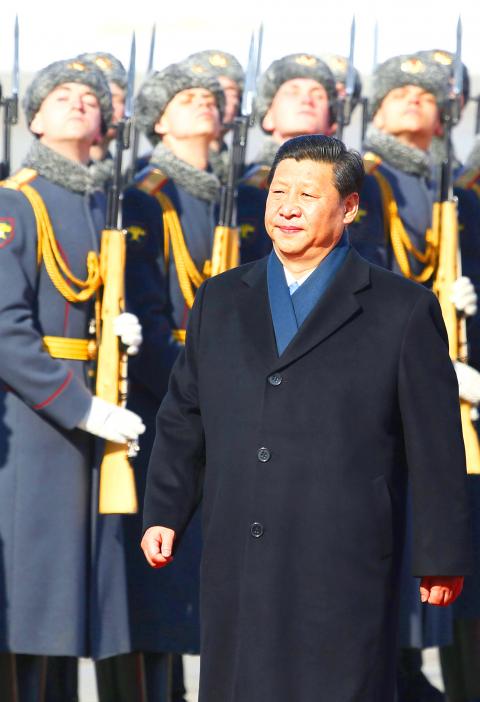Chinese President Xi Jinping (習近平) sent a signal to the US and Europe yesterday by visiting Russia on his first foreign trip as leader, underlining the importance of Beijing’s growing alliance with Moscow.
The world’s largest energy producer, Russia, and its biggest consumer, China, want particularly to bolster their clout as a financial and geopolitical counterweight to Washington, whose “Asia pivot” regional strategy worries Beijing.
Xi and Russian President Vladimir Putin, who were to meet last night, may preside over deals that would make Beijing Russia’s top customer for oil, although they are not expected to sign a long-sought agreement on supplies of pipeline gas to China.

Photo: EPA
Just before Xi arrived with first lady Peng Liyuan (彭麗媛), a US$2 billion deal was announced by Russian and Chinese companies to develop coal resources in eastern Siberia, which underlined the countries’ intentions.
Putin has said he wants to “catch the Chinese wind in our economic sail” and that desire will grow stronger if China overtakes the US as the world’s largest economy during Xi’s 10-year term.
Xi’s visit overshadowed a meeting between leaders of the Russian government and the European Commission that was also taking place in Moscow.
Putin and Xi, less than a year apart in age, echoed one another in interviews before the visit, each saying the Chinese leader’s choice of Moscow as his first destination was evidence of the “strategic partnership” between the nations.
A smiling Xi, 59, recalled that he read Russian literature in his younger days. Putin, 60, said that Russian-Chinese relations were at “the best in their centuries-long history.”
The two UN Security Council members’ solidarity on important global issues has strengthened in recent years.
They have joined forces three times to block Western-backed measures on the conflict in Syria despite talk of grumbling in Beijing, and Russia has followed China’s lead on North Korea — two issues that would likely come up in yesterday’s talks.
They have negotiated alongside the West on Iran’s nuclear program, but have watered down past sanctions in the UN Security Council and opposed new punitive measures as counterproductive.
Russia has added to Japan’s woes over territorial disputes with Beijing by playing up its control of an archipelago claimed by Tokyo. Beijing and Moscow have also stood side-by-side in rejecting Western criticism of their record on human rights.
However, the lockstep movement on the global stage has not translated into easy agreement on bilateral energy deals.
A huge business complex on the edge of Moscow, decorated with Chinese paintings and red silk armchairs, is the kind of enterprise Xi wants to nurture in Russia.
Xi’s presidency is seen as a chance to put new impetus into such projects and into ties with Russia as a whole, although Putin said this week that bilateral trade had more than doubled in five years and reached US$87.5 billion last year.
However, the trade volume is still about five times smaller than that of Russia with the EU, and also far smaller than China’s trade with the US.

ACTION PLAN: Taiwan would expand procurement from the US and encourage more companies to invest in the US to deepen bilateral cooperation, Lai said The government would not impose reciprocal tariffs in retaliation against US levies, President William Lai (賴清德) said yesterday, as he announced five strategies to address the issue, including pledging to increase Taiwanese companies’ investments in the US. Lai has in the past few days met with administrative and national security officials, as well as representatives from various industries, to explore countermeasures after US President Donald Trump on Wednesday last week announced a 32 percent duty on Taiwanese imports. In a video released yesterday evening, Lai said that Taiwan would not retaliate against the US with higher tariffs and Taiwanese companies’ commitments to

Intelligence agents have recorded 510,000 instances of “controversial information” being spread online by the Chinese Communist Party (CCP) so far this year, the National Security Bureau (NSB) said in a report yesterday, as it warned of artificial intelligence (AI) being employed to generate destabilizing misinformation. The bureau submitted a written report to the Legislative Yuan in preparation for National Security Bureau Director-General Tsai Ming-yen’s (蔡明彥) appearance before the Foreign Affairs and National Defense Committee today. The CCP has been using cognitive warfare to divide Taiwanese society by commenting on controversial issues such as Taiwan Semiconductor Manufacturing Co’s (TSMC, 台積電) investments in the

‘SPECIAL CHANNEL’: Taipei’s most important tasks are to stabilize industries affected by Trump’s trade tariffs and keep negotiations with Washington open, a source said National Security Council Secretary-General Joseph Wu (吳釗燮) arrived in the US for talks with US President Donald Trump’s administration, a source familiar with the matter said on Friday. Wu was leading a delegation for a meeting known as the “special channel,” the Financial Times reported earlier. It marked Trump’s first use of the channel since returning to the White House on Jan. 20. Citing a source familiar with the matter, the Financial Times reported that Minister of Foreign Affairs Lin Chia-lung (林佳龍) was also a part of the delegation. The visit came days after China concluded war games around Taiwan and amid Trump’s

HELPING HAND: The steering committee of the National Stabilization Fund is expected to hold a meeting to discuss how and when to utilize the fund to help buffer the sell-off The TAIEX plunged 2,065.87 points, or 9.7 percent, to close at 19,232.35 yesterday, the highest single-day percentage loss on record, as investors braced for US President Donald Trump’s tariffs after an extended holiday weekend. Amid the pessimistic atmosphere, 945 listed companies led by large-cap stocks — including Taiwan Semiconductor Manufacturing Co (TSMC, 台積電), Hon Hai Precision Industry Co (鴻海精密) and Largan Precision Co (大立光) — fell by the daily maximum of 10 percent at the close, Taiwan Stock Exchange data showed. The number of listed companies ending limit-down set a new record, the exchange said. The TAIEX plunged by daily maxiumu in just